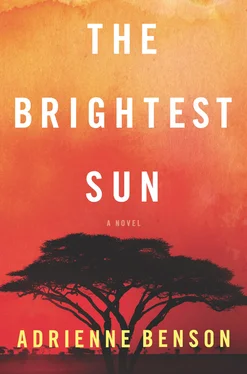“Ooh, Simi.” Loiyan cackled. She was the second wife, and although she often kept the women laughing with her jokes and her brassy interactions with the men, she had a meanness that could flare up with little warning. In the beginning, Simi was frightened of Loiyan, but she wasn’t anymore. Still, she didn’t like Loiyan—she thought of her as she did a snake, more dangerous because the strike was often unexpected.
“Ooh, Simi.” Loiyan stood tall and tipped her head back. “You will be too important. You will be an American yourself.” Loiyan pranced in place, pretending to be a white woman.
“You don’t look like an American,” Simi said, “you look like a sick hippo.” All the women laughed, and Loiyan sucked her teeth and hunkered down again to rinse her pile of clothes in the slow-moving river.
Simi was excited by the news of the muzungu. When her husband came to her the next night, Simi handed him a cup of chai and asked him why the American was coming.
“She wants to study us, the way we do things.”
Simi was surprised. She couldn’t imagine why anyone would be curious about the lives they led in the manyatta. She couldn’t imagine why an American would come all the way here just to watch them.
She had seen white people before, but never up close. Usually she saw them behind the glass of a vehicle window, through a film of dust billowing from under the slow-rolling tires as she stood by the side of the road. Often, the white faces on the other side of the glass stared at her, too, with eyes as wide and curious as hers. Sometimes, if the windows were open, the white people would lift their hands and call “Hello!” It always thrilled Simi when this happened. English was her best subject at school, and hearing words she’d practiced over and over again coming from the mouths of strangers was exciting. She loved the way learning a different language had made her feel free—like she had a key to a new life. When she waved and called “Hello” into the van’s dusty wake, she felt important. English was her connection to the world outside, and now, though her school days were long past, she was proud of her knowledge. Her mother was right; nobody could take away the things she knew.
In the early days, the American hardly spoke. She wandered like a ghost through the dust in the manyatta and started at the movements of the cattle. Simi watched her closely. She felt too shy to talk to the white woman at first, but she also worried that if the American stayed frightened and out of place, she would leave. Simi desperately wanted her to stay. She watched how the other Maasai women crowded into the American’s little house—one they’d constructed for her the day she arrived—and just sat there, watching the strange woman and gossiping among themselves. Finally Simi slipped in with them one afternoon and watched the white woman trying to light a fire in her fire pit. There were no embers there, and Simi quickly got up and fetched a bright coal from her own house and brought it back. She sifted it into the American’s fire pit, added a few twigs and dry grasses and blew it all into a flame.
“You must keep some fire alive all the time,” she said quietly. “We let it burn, just a little, even at night. We must always have our own fire, miss.”
The white woman smiled. “You speak English! Thank God! I’ve been needing you!” Simi felt herself flush, and she knew the other women were watching. She thought she heard Loiyan sucking her teeth.
“Please,” the American said, “tell me your name. Mine is Leona.”
From that moment, Leona was always near Simi. “Help me, Simi,” Leona would say, and the questions that followed were endless and wide-ranging—from how many handfuls of tea to toss into boiling water for chai, to how a man selects a wife. Simi grew bolder in her English, and lost her shyness with Leona. She scolded Leona the time Leona forgot to dip her head when greeting an elder, and warned her never to walk far from the manyatta in the evenings, when the shadows grew long and the hyenas and leopards stirred from their dens. With Leona next to her at the river, washing their clothes together, Simi found Loiyan left her alone. It wasn’t enjoyable to tease Simi anymore when Simi had a friend to speak to in a language Loiyan couldn’t understand.
Simi came to understand that Leona’s life back in America was completely different from the life they all lived here. Leona showed them photos of enormously tall buildings, expanses of grass so green it almost hurt their eyes to see it.
“Where are the cattle?” Simi asked when she saw the grass. “They must be too fat to walk!”
The images were breathtaking—it was hard to imagine they were real. Leona explained to Simi that not only did America look vastly different from Loita, but that life there—everything from clothing to speech to thoughts themselves—were unlike those here. Simi knew that some of the other women, ones who had never gone to school and seen a photo in a book, didn’t understand how to grasp the images and ideas Leona introduced them to; their minds were so firmly here that they could not see things differently. Simi could, though. She’d read stories about people different from herself and knew that the Maasai way wasn’t the only way people lived. The images in the pictures and the stories Leona told were like dreams. They flickered in her mind and flashed against the reality she saw around her constantly, two worlds—one inside herself, and one outside, like hot flames that burned blue and orange and red all at the same time.
In the evenings, Leona would come to Simi’s house. Her Maa was improving. Often, they practiced together. Leona would look through her notebooks and ask Simi questions about things she’d seen that day, and note ages and names of the people in the village. In return, Leona would teach Simi American slang. Simi loved the feel in her mouth that the new words gave her, and took to peppering her Maa with “That’s cool!” and “For real?” Other nights they’d drink tea and just stare into the fire quietly. One night, after Leona had been in the manyatta for several weeks, she sat on a low stool next to Simi. Simi threaded beads onto a strip of leather for a bracelet. It was dark outside, and chilly. “You don’t have children,” Leona stated.
Simi was relaxed in Leona’s presence but this statement—vocalized so clearly and directly—shocked her. It was unexpected, too bold for Simi’s comfort. She started and spilled some tea in her lap. It was hot and it stung. Her eyes welled, and she glanced across the bright embers of the fire and saw Leona watching her. There was no malice in Leona’s face. Part of Simi wanted to bury the subject forever, but another part was desperate to talk about the pain, release it to someone else in a way she couldn’t with the other women. Leona’s face was clear, her eyes blank.
“How long have you been married?” Simi heard Leona’s question and shifted uncomfortably.
“Three years,” Simi answered.
“It’s a problem to be a wife without a child?” Leona was speaking as if she had her notebook and pen with her, but Simi saw she had neither.
Simi answered in English. To say the words in her language made them hurt more coming out. “We say that a woman who hasn’t given birth is like a wilderness. A woman or a man with children to remember them can never die. But a person like me? When I am gone, nobody will remember.”
“In America people can choose to have a baby or not,” Leona said. “But even so, there are people who want to but can’t. This is something that happens everywhere, Simi. Have you seen a doctor?”
Simi didn’t answer. She was tingling with discomfort now. There was no way to explain it all to Leona. Her pain was not something for an American notebook, something to be inscribed with a pen on paper. Simi’s bitter frustration about not having a child, and her fear of the repercussions, were not something she would ever let see the light of day. She tried to keep herself from even thinking of them. How could sharing the story in words even scratch the surface of Simi’s disappointment and terror at the way her own body betrayed her? She was grateful when, after a long silence, Leona smiled and said she was tired, and then stood up to leave.
Читать дальше












